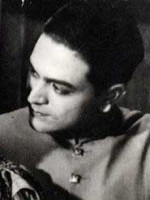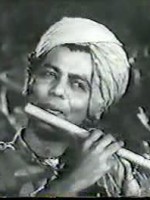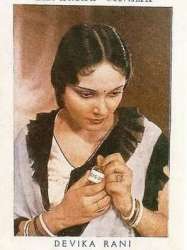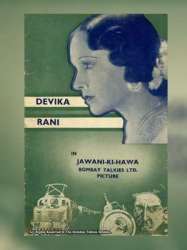Devika Rani is a Actor, Producer and Set Decoration Indian born on 30 march 1908 at Andhra Pradesh (Inde)
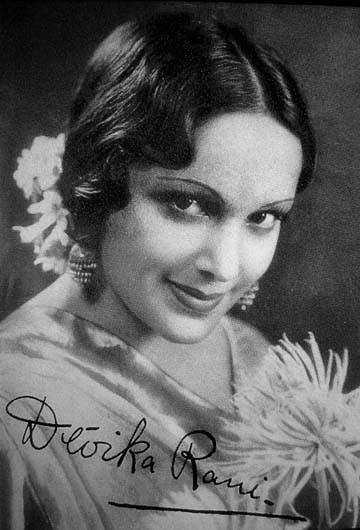
Devika Rani Chaudhuri, usually known as Devika Rani (30 March 1908 – 9 March 1994), was an actress in Indian films who was active during the 1930s and 1940s. Widely acknowledged as the first lady of Indian cinema, Devika Rani had a successful film career that spanned 10 years.
Devika Rani's early years were mostly spent in London where she studied architecture, and started her career as a textile engineer. In 1928, she met Himanshu Rai, an Indian film-producer, who persuaded her to join his production crew. She assisted in costumes design and art direction for Rai's film A Throw of Dice (1929). The two married in 1929, and went to Germany where Devika Rani learned different aspects of film-making in the UFA Studios in Berlin. Rai then cast her in the 1933 talkie Karma in which her performance received critical acclaim. Returning to India, the couple established their production studio Bombay Talkies in 1934. They produced many women-centric films throughout the decade, with Devika Rani portraying lead roles in most of them. Her on-screen pairing with Ashok Kumar became popular in India.
Following Rai's death in 1940, Devika Rani took over the control of the studio and produced several films. At the peak of her career she retired from films, and in 1945 she married Russian painter Svetoslav Roerich, leading thereafter life of a recluse. Her persona and roles in films were often considered socially unconventional. Her awards include the Padmashri (1958), Dadasaheb Phalke Award (1970) and the Soviet Land Nehru Award (1990).
Devika Rani was born in a Bengali family in Waltair, now Visakhapatnam in Andhra Pradesh. Her father, Col. M. N. Chaudhuri, was the first Indian Surgeon-General of Madras Presidency. Devika Rani was the great-grandniece of the Nobel Laureate poet Rabindranath Tagore.. Her paternal uncles were barristers Ashutosh Chaudhuri (the chief justice of Calcutta High Court), Jogesh Chandra Chaudhuri, and Bengali writer Pramatha Chaudhuri.
Devika Rani's childhood was mostly spent in England; at the age of nine she moved to the country where she was enrolled in a boarding school. After completing her schooling in the early 1920s, she got an admission from the Royal Academy of Dramatic Art (RADA) and the Royal Academy of Music in London to study acting and music. She followed that with a course in architecture, textile and decor design, and apprenticed under Elizabeth Arden. Upon completion, Devika Rani started her career as textile engineer.
In 1928 Devika Rani met Himanshu Rai, an Indian barrister-turned-film maker, in London when he was planning for his forthcoming film A Throw of Dice. Impressed with her "exceptional skills", Rai persuaded her to join the production team of A Throw of Dice to which she readily agreed. Devika Rani went to India along with Rai and worked on the Indo-German-British co-production—Throw of Dice—by assisting in areas such as costume designing and art direction. The two went to Germany for the post-production work, where she happened to watch the making of German films of G. W. Pabst and Fritz Lang. Inspired by their way of film-making, she enrolled herself for a film-making course in Universum Film AG studio in Berlin. While in the studio, Devika Rani learnt various aspects of film-making in addition to a special course in film acting. Shortly after the release of Throw of Dice, she married Rai in 1929. During this time, Devika Rani acted in a play alongside her husband for which they received many accolades in Switzerland and the Scandinavian countries. During this time she was also trained in the production unit of Max Reinhardt, an Austrian theatre director.
Acting career
Debut and partnership with Himanshu Rai
Devika Rani and Rai returned to India to produce a film titled Karma (1933). The film was Rai's first talkie and like his previous films it was a joint production among India, Germany and the United Kingdom. Rai, who played the lead role, decided to cast Devika Rani as the female lead thus marking her acting debut. Karma is credited for being the first English talkie made by an Indian. It was one of the earliest Indian films to feature a kissing scene. The scene involving Rai and Devika Rani lasted for about four minutes, was known to be the longest kissing shot in Indian cinema as of 2014. In addition to acting in the film, Devika Rani rendered her voice for a bi-lingual song—in English and Hindi; the song is credited for being Bollywood's first English song. Made in English and Hindi, the film premiered in London in May 1933. Alongside a special screening for the Royal family at Windsor, the film was well received throughout Europe. Devika Rani's performance was internationally acclaimed as she won "rave reviews" in the London media.
A critic from The Daily Telegraph noted Devika Rani for her "beauty" and "charm" while also crediting her to be a "potential star of the first magnitude". Following the release of the film, she was invited by the B.B.C. to enact a role in their first ever television broadcast in Britain in 1933. In addition, she inaugurated the company's first short wave radio transmission to India. In spite of its success in England, Karma did not interest the Indian audience and turned out be a failure in India when it was released in Hindi as Nagin Ki Ragini in early 1934. However, the film received good critical response and helped Devika Rani establish herself as a leading actress in Indian cinema. Indian independence activist and poet Sarojini Naidu called her a "lovely and gifted little lady".
Bombay Talkies and success
After the critical success of Karma, the couple returned to India and in 1934 started a film studio named Bombay Talkies partnering with Niranjan Pal, a Bengali playwright and screenwriter who Devika Rani had met previously in London, and Franz Osten, who directed several of Rai's films. Upon inception, it was one of the "best-equipped" film studios in the country. The studio would serve as a launch pad for future actors including Ashok Kumar, Leela Chitnis, Dilip Kumar, Raj Kapoor, Madhubala and Mumtaz. The studio's first film Jawani Ki Hawa (1935), a crime thriller, starring Devika Rani and Najam-ul-Hassan, was shot fully on a train. During the filming of the studio's next venture Jeevan Naiya, Devika Rani eloped with her co-star Hassan after the two developed a romantic relationship. Subsequently, the production was stalled and the studio suffered financial losses.Sashadhar Mukherjee, an assistant sound-engineer at the studio, managed to bring back and convince Devika Rani to act in the film. The crew, however replaced Hassan with debutant Ashok Kumar, who was a relative of Mukherjee working in the laboratory of the studio.
Achhut Kanya (1936), the studio's next production was a tragedy drama that had Devika Rani and Ashok Kumar portraying the roles of an untouchable girl and a Brahmin boy who fall in love. The film is considered a "landmark" in Indian cinema as it challenged the caste system in the country. The casting of Devika Rani was considered a mismatch as her looks did not match the role of a poor untouchable girl by virtue of her "upper-class upbringing". However, her pairing with Ashok Kumar became popular and they went on to star in as many as ten films together with most of them being Bombay Talkies productions.
In the 1930s, Bombay Talkies produced several women-centric films with Devika Rani playing the lead role in all of them. In majority of the films produced by the studio, she was paired opposite Ashok Kumar, who was "overshadowed" by her. Jeevan Prabhat, released in 1937, saw a role-reversal between Devika Rani and Ashok Kumar—she played a higher-caste Brahmin woman who is mistaken by society of having an extra-marital affair with an untouchable man. Her next release Izzat (1937), based on Romeo and Juliet, was set in the medieval period and depicted two lovers belonging to enemy clans of a Maratha empire. Nirmala, released in the following year, dealt with the plight of a child-less woman who is told by an astrologer to abandon her husband to ensure successful pregnancy. In Vachan, her second release of the year, she played a Rajput princess. Durga, her only release in 1939, was a romantic drama that told the story of an orphaned girl and a village doctor, played by Ashok Kumar.
Retirement
Following the death of Rai in 1940, there was a rift between two parties of the Bombay Talkies led by Mukherjee and Amiya Chakravarty. Devika Rani assumed principal responsibility and took over the studio along with Mukherjee. In 1941, she produced and acted in Anjaan co-starring Ashok Kumar. In the subsequent years, she produced two successful films under the studio—Basant and Kismet—both starring Ashok Kumar. Kismet (1943) contained anti-British messages (India was under British rule at that time) and turned out to be a "record-breaking" film. Devika Rani made her last film appearance in Hamari Baat (1943), which had Raj Kapoor playing a small role. She handpicked newcomer Dilip Kumar for a role in Jwar Bhata (1944), produced by her on behalf of the studio. An internal politics that arose in the studio led prominent personalities including Mukherjee and Ashok Kumar to part ways with her and set up a new studio called Filmistan. Due to lack of support and interest, Devika Rani decided to quit the film industry. In an interview to journalist Raju Bharatan, she mentioned that her idea of not willing to compromise on "artistic values" of film-making as one of the major reasons for her quitting the industry.
Later life
Following her retirement from films, Devika Rani married Russian painter Svetoslav Roerich, son of Russian artist Nicholas Roerich, in 1945. After marriage, the couple moved to Manali, Himachal Pradesh where they got acquainted with the Nehru family. During her stay in Manali, Devika Rani made a few documentaries on wildlife. After staying in Manali for some years, they moved to Bangalore, Karnataka, and settled there managing an export company. The couple bought a 450 acres (1,800,000 m) estate on the outskirts of the city and led a solitary life for the rest of their lives. She died of bronchitis on 9 March 1994—a year after Roerich died—in Bangalore. At her funeral, Devika Rani was given full state honors. Following her death, the estate was on litigation for many years as the couple had no legal claimants; Devika Rani remained childless throughout her life. In August 2011, the Government of Karnataka acquired the estate after the Supreme Court of India passed the verdict in favour of them.
^ "B-town women who dared!". The Hindustan Times. Retrieved 28 April 2014.
^ Erik 1980, p. 93.
^ "Devika Rani" (PDF). Press Information Bureau. p. 1. Retrieved 8 April 2014.
^ Manjapra 2014, p. 258.
^ Paul, Samar (17 March 2012). "Pramatha Chaudhury's home: Our responsibility". Financial Express. Retrieved 8 April 2014.
^ Rogowski 2010, p. 168.
^ "Devika Rani Roerich". Roerich & DevikaRani Roerich Estate Board, Government of Karnataka. Retrieved 8 April 2014.
^ Saran 2014, p. 27.
^ Ghosh 1995, pp. 28–29.
^ Ghosh 1995, p. 29.
^
^ Gulzar, Nihalani & Chatterjee 2003, p. 545.
^ Patel 2012, p. 19.
^ "Karma 1933". The Hindu. 10 January 2009. Retrieved 13 April 2014.
^ Jaikumar 2006, p. 229.
^ Barrass, Natalie (14 April 2014). "In bed with Bollywood: sex and censorship in Indian cinema". The Guardian. Retrieved 28 April 2014.
^ Dasgupta, Priyanka (30 April 2012). "India's longest kissing scene clips in Paoli film". The Times of India. Retrieved 28 April 2014.
^ Ranchan 2014, p. 42.
^ Chakravarty, Riya (3 May 2013). "Indian cinema@100: 40 Firsts in Indian cinema". NDTV. Retrieved 6 May 2014.
^ "Pathbreaker by Karma". The Hindu. 10 January 2009. Retrieved 13 April 2014.
^ "Top heroines of Bollywood". India Today. Retrieved 13 April 2014.
^ Manjapra 2014, p. 239.
^ Kohli, Suresh (15 April 2014). "Indian cinema's prima donna". The Deccan Herald. Retrieved 15 April 2014.
^ Hardy 1997, p. 180.
^ Manṭo 2003, pp. 244–245.
^ Manjapra 2014, p. 270.
^ Majumdar 2009, p. 88.
^ Manjapra 2014, p. 271.
^ Patel 2012, p. 23.
^ Baghdadi & Rao 1995, p. 353.
^ Patel 2012, p. 27.
^ Patel 2012, p. 24.
^ Patel 2012, p. 24–25.
^ Patel 2012, p. 25.
^ Kharegat, Pheroze (20 August 2011). "The Sad Saga of Roerich Treasures". The Navhind Times. Retrieved 15 April 2014.
^ "The Rediff Special/M D Riti". 4 October 2002. Archived from the original on 20 October 2012. Retrieved 28 April 2014.
^ "Devika Rani Roerich". Sarasota Herald-Tribune. 11 March 1994. Retrieved 28 April 2014.
^ Kaur 2013, p. 12.
^ Rohith B. R. (19 February 2014). "Roerichs' Tataguni estate to get a new life". The Times of India. Retrieved 15 April 2014.
Source : Wikidata
Devika Rani

Birth name Devika Rani Chaudhuri
Nationality Inde
Birth 30 march 1908 at Andhra Pradesh (Inde)
Death 9 march 1994 (at 85 years) at Bangalore (Inde)
Awards Padma Shri, Dadasaheb Phalke Award
Nationality Inde
Birth 30 march 1908 at Andhra Pradesh (Inde)
Death 9 march 1994 (at 85 years) at Bangalore (Inde)
Awards Padma Shri, Dadasaheb Phalke Award
Devika Rani's early years were mostly spent in London where she studied architecture, and started her career as a textile engineer. In 1928, she met Himanshu Rai, an Indian film-producer, who persuaded her to join his production crew. She assisted in costumes design and art direction for Rai's film A Throw of Dice (1929). The two married in 1929, and went to Germany where Devika Rani learned different aspects of film-making in the UFA Studios in Berlin. Rai then cast her in the 1933 talkie Karma in which her performance received critical acclaim. Returning to India, the couple established their production studio Bombay Talkies in 1934. They produced many women-centric films throughout the decade, with Devika Rani portraying lead roles in most of them. Her on-screen pairing with Ashok Kumar became popular in India.
Following Rai's death in 1940, Devika Rani took over the control of the studio and produced several films. At the peak of her career she retired from films, and in 1945 she married Russian painter Svetoslav Roerich, leading thereafter life of a recluse. Her persona and roles in films were often considered socially unconventional. Her awards include the Padmashri (1958), Dadasaheb Phalke Award (1970) and the Soviet Land Nehru Award (1990).
Biography
Early lifeDevika Rani was born in a Bengali family in Waltair, now Visakhapatnam in Andhra Pradesh. Her father, Col. M. N. Chaudhuri, was the first Indian Surgeon-General of Madras Presidency. Devika Rani was the great-grandniece of the Nobel Laureate poet Rabindranath Tagore.. Her paternal uncles were barristers Ashutosh Chaudhuri (the chief justice of Calcutta High Court), Jogesh Chandra Chaudhuri, and Bengali writer Pramatha Chaudhuri.
Devika Rani's childhood was mostly spent in England; at the age of nine she moved to the country where she was enrolled in a boarding school. After completing her schooling in the early 1920s, she got an admission from the Royal Academy of Dramatic Art (RADA) and the Royal Academy of Music in London to study acting and music. She followed that with a course in architecture, textile and decor design, and apprenticed under Elizabeth Arden. Upon completion, Devika Rani started her career as textile engineer.
In 1928 Devika Rani met Himanshu Rai, an Indian barrister-turned-film maker, in London when he was planning for his forthcoming film A Throw of Dice. Impressed with her "exceptional skills", Rai persuaded her to join the production team of A Throw of Dice to which she readily agreed. Devika Rani went to India along with Rai and worked on the Indo-German-British co-production—Throw of Dice—by assisting in areas such as costume designing and art direction. The two went to Germany for the post-production work, where she happened to watch the making of German films of G. W. Pabst and Fritz Lang. Inspired by their way of film-making, she enrolled herself for a film-making course in Universum Film AG studio in Berlin. While in the studio, Devika Rani learnt various aspects of film-making in addition to a special course in film acting. Shortly after the release of Throw of Dice, she married Rai in 1929. During this time, Devika Rani acted in a play alongside her husband for which they received many accolades in Switzerland and the Scandinavian countries. During this time she was also trained in the production unit of Max Reinhardt, an Austrian theatre director.
Acting career
Debut and partnership with Himanshu Rai
Devika Rani and Rai returned to India to produce a film titled Karma (1933). The film was Rai's first talkie and like his previous films it was a joint production among India, Germany and the United Kingdom. Rai, who played the lead role, decided to cast Devika Rani as the female lead thus marking her acting debut. Karma is credited for being the first English talkie made by an Indian. It was one of the earliest Indian films to feature a kissing scene. The scene involving Rai and Devika Rani lasted for about four minutes, was known to be the longest kissing shot in Indian cinema as of 2014. In addition to acting in the film, Devika Rani rendered her voice for a bi-lingual song—in English and Hindi; the song is credited for being Bollywood's first English song. Made in English and Hindi, the film premiered in London in May 1933. Alongside a special screening for the Royal family at Windsor, the film was well received throughout Europe. Devika Rani's performance was internationally acclaimed as she won "rave reviews" in the London media.
A critic from The Daily Telegraph noted Devika Rani for her "beauty" and "charm" while also crediting her to be a "potential star of the first magnitude". Following the release of the film, she was invited by the B.B.C. to enact a role in their first ever television broadcast in Britain in 1933. In addition, she inaugurated the company's first short wave radio transmission to India. In spite of its success in England, Karma did not interest the Indian audience and turned out be a failure in India when it was released in Hindi as Nagin Ki Ragini in early 1934. However, the film received good critical response and helped Devika Rani establish herself as a leading actress in Indian cinema. Indian independence activist and poet Sarojini Naidu called her a "lovely and gifted little lady".
Bombay Talkies and success
After the critical success of Karma, the couple returned to India and in 1934 started a film studio named Bombay Talkies partnering with Niranjan Pal, a Bengali playwright and screenwriter who Devika Rani had met previously in London, and Franz Osten, who directed several of Rai's films. Upon inception, it was one of the "best-equipped" film studios in the country. The studio would serve as a launch pad for future actors including Ashok Kumar, Leela Chitnis, Dilip Kumar, Raj Kapoor, Madhubala and Mumtaz. The studio's first film Jawani Ki Hawa (1935), a crime thriller, starring Devika Rani and Najam-ul-Hassan, was shot fully on a train. During the filming of the studio's next venture Jeevan Naiya, Devika Rani eloped with her co-star Hassan after the two developed a romantic relationship. Subsequently, the production was stalled and the studio suffered financial losses.Sashadhar Mukherjee, an assistant sound-engineer at the studio, managed to bring back and convince Devika Rani to act in the film. The crew, however replaced Hassan with debutant Ashok Kumar, who was a relative of Mukherjee working in the laboratory of the studio.
Achhut Kanya (1936), the studio's next production was a tragedy drama that had Devika Rani and Ashok Kumar portraying the roles of an untouchable girl and a Brahmin boy who fall in love. The film is considered a "landmark" in Indian cinema as it challenged the caste system in the country. The casting of Devika Rani was considered a mismatch as her looks did not match the role of a poor untouchable girl by virtue of her "upper-class upbringing". However, her pairing with Ashok Kumar became popular and they went on to star in as many as ten films together with most of them being Bombay Talkies productions.
In the 1930s, Bombay Talkies produced several women-centric films with Devika Rani playing the lead role in all of them. In majority of the films produced by the studio, she was paired opposite Ashok Kumar, who was "overshadowed" by her. Jeevan Prabhat, released in 1937, saw a role-reversal between Devika Rani and Ashok Kumar—she played a higher-caste Brahmin woman who is mistaken by society of having an extra-marital affair with an untouchable man. Her next release Izzat (1937), based on Romeo and Juliet, was set in the medieval period and depicted two lovers belonging to enemy clans of a Maratha empire. Nirmala, released in the following year, dealt with the plight of a child-less woman who is told by an astrologer to abandon her husband to ensure successful pregnancy. In Vachan, her second release of the year, she played a Rajput princess. Durga, her only release in 1939, was a romantic drama that told the story of an orphaned girl and a village doctor, played by Ashok Kumar.
Retirement
Following the death of Rai in 1940, there was a rift between two parties of the Bombay Talkies led by Mukherjee and Amiya Chakravarty. Devika Rani assumed principal responsibility and took over the studio along with Mukherjee. In 1941, she produced and acted in Anjaan co-starring Ashok Kumar. In the subsequent years, she produced two successful films under the studio—Basant and Kismet—both starring Ashok Kumar. Kismet (1943) contained anti-British messages (India was under British rule at that time) and turned out to be a "record-breaking" film. Devika Rani made her last film appearance in Hamari Baat (1943), which had Raj Kapoor playing a small role. She handpicked newcomer Dilip Kumar for a role in Jwar Bhata (1944), produced by her on behalf of the studio. An internal politics that arose in the studio led prominent personalities including Mukherjee and Ashok Kumar to part ways with her and set up a new studio called Filmistan. Due to lack of support and interest, Devika Rani decided to quit the film industry. In an interview to journalist Raju Bharatan, she mentioned that her idea of not willing to compromise on "artistic values" of film-making as one of the major reasons for her quitting the industry.
Later life
Following her retirement from films, Devika Rani married Russian painter Svetoslav Roerich, son of Russian artist Nicholas Roerich, in 1945. After marriage, the couple moved to Manali, Himachal Pradesh where they got acquainted with the Nehru family. During her stay in Manali, Devika Rani made a few documentaries on wildlife. After staying in Manali for some years, they moved to Bangalore, Karnataka, and settled there managing an export company. The couple bought a 450 acres (1,800,000 m) estate on the outskirts of the city and led a solitary life for the rest of their lives. She died of bronchitis on 9 March 1994—a year after Roerich died—in Bangalore. At her funeral, Devika Rani was given full state honors. Following her death, the estate was on litigation for many years as the couple had no legal claimants; Devika Rani remained childless throughout her life. In August 2011, the Government of Karnataka acquired the estate after the Supreme Court of India passed the verdict in favour of them.
^ "B-town women who dared!". The Hindustan Times. Retrieved 28 April 2014.
^ Erik 1980, p. 93.
^ "Devika Rani" (PDF). Press Information Bureau. p. 1. Retrieved 8 April 2014.
^ Manjapra 2014, p. 258.
^ Paul, Samar (17 March 2012). "Pramatha Chaudhury's home: Our responsibility". Financial Express. Retrieved 8 April 2014.
^ Rogowski 2010, p. 168.
^ "Devika Rani Roerich". Roerich & DevikaRani Roerich Estate Board, Government of Karnataka. Retrieved 8 April 2014.
^ Saran 2014, p. 27.
^ Ghosh 1995, pp. 28–29.
^ Ghosh 1995, p. 29.
^
^ Gulzar, Nihalani & Chatterjee 2003, p. 545.
^ Patel 2012, p. 19.
^ "Karma 1933". The Hindu. 10 January 2009. Retrieved 13 April 2014.
^ Jaikumar 2006, p. 229.
^ Barrass, Natalie (14 April 2014). "In bed with Bollywood: sex and censorship in Indian cinema". The Guardian. Retrieved 28 April 2014.
^ Dasgupta, Priyanka (30 April 2012). "India's longest kissing scene clips in Paoli film". The Times of India. Retrieved 28 April 2014.
^ Ranchan 2014, p. 42.
^ Chakravarty, Riya (3 May 2013). "Indian cinema@100: 40 Firsts in Indian cinema". NDTV. Retrieved 6 May 2014.
^ "Pathbreaker by Karma". The Hindu. 10 January 2009. Retrieved 13 April 2014.
^ "Top heroines of Bollywood". India Today. Retrieved 13 April 2014.
^ Manjapra 2014, p. 239.
^ Kohli, Suresh (15 April 2014). "Indian cinema's prima donna". The Deccan Herald. Retrieved 15 April 2014.
^ Hardy 1997, p. 180.
^ Manṭo 2003, pp. 244–245.
^ Manjapra 2014, p. 270.
^ Majumdar 2009, p. 88.
^ Manjapra 2014, p. 271.
^ Patel 2012, p. 23.
^ Baghdadi & Rao 1995, p. 353.
^ Patel 2012, p. 27.
^ Patel 2012, p. 24.
^ Patel 2012, p. 24–25.
^ Patel 2012, p. 25.
^ Kharegat, Pheroze (20 August 2011). "The Sad Saga of Roerich Treasures". The Navhind Times. Retrieved 15 April 2014.
^ "The Rediff Special/M D Riti". 4 October 2002. Archived from the original on 20 October 2012. Retrieved 28 April 2014.
^ "Devika Rani Roerich". Sarasota Herald-Tribune. 11 March 1994. Retrieved 28 April 2014.
^ Kaur 2013, p. 12.
^ Rohith B. R. (19 February 2014). "Roerichs' Tataguni estate to get a new life". The Times of India. Retrieved 15 April 2014.
Usually with
Filmography of Devika Rani (14 films)
Actress
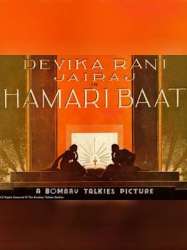
Hamari Baat (1943)
Genres Drama
Actors Devika Rani, Suraiya, David Abraham, Paidi Jairaj, Raj Kapoor, Mumtaz Ali
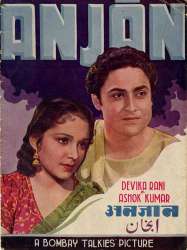
Anjaan (1941)
, 2h24Directed by Amiya Chakravarty
Actors Devika Rani, Ashok Kumar, David Abraham, Om Prakash
Roles Indira
Indira (Devika Rani) is a poor governess employed by the widow, Ranima (Gulab), of a Zamindar for her two children. The estate manager Ramnath (Girish) falls in love with her and turns to villainous acts in order to win her over.Devika falls in love with the doctor Ajit, played by Ashok Kumar, who looks after Ranima and is guardian to the two children. Following a scheming plot when Ranima dies, Ramnath implicates Ajit, for which he is apprehended. A court scene follows where Ajit is successful in acquitting himself. Indira and Ajit get together in the end, while the villain is convicted.
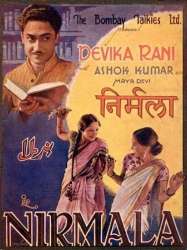
Nirmala (1938)
Genres Drama, Musical
Actors Devika Rani, Ashok Kumar
Roles Nirmala
Rating56%





Nirmala (Guldaban) est une petite fille qui aime ses poupées et joue à la maman lorsque sa propre mère (Saroj Borkar) a le dos tourné. Adulte (Devika Rani), elle n'a rien perdu de sa passion pour les enfants et rêve de devenir mère à son tour. Pour l'instant, elle vient d'être admise à l'université. Pourtant ses parents voient venir le moment de lui trouver un mari. Rajnikhant son père (P.F. Pithawala), avait promis autrefois la main de Nirmala à Loknath (M. Nazir), le fils de son meilleur ami. Pensant bien faire, il conclut l'alliance matrimoniale et demande à l'astrologue de déterminer la date des noces.

Izzat (1937)
, 2h24Actors Devika Rani, Ashok Kumar, Mumtaz Ali
Roles Radha
Rating62%





The Marathas and the Bhils have been living in peace and mutual respect for a period of twenty-five years, due to the efforts of the two chiefs, the Maratha Patel and the Bhil chief Maruti. The Maratha Patel's son died at a young age and his nephew, Balaji, is being considered by the Patel to replace him. However, Balaji is against any sort of cordial relationship with the Bhils, and opposes any favourable treatment given to them. This upsets the Patel, who falls ill. He realises the consequence of Balaji succeeding him and regrets his decision made earlier to that effect. He wants to send a message to the Diwan (Chief Minister) that Balaji should not become the Patel following his death. The letter is intercepted by Balaji. The old chief dies, making Balaji the new Patel.

Jeevan Prabhat (1937)
, 2h24Actors Devika Rani, Mumtaz Ali, Kishore Sahu
Roles Uma
Set in a village, a young Brahmin couple Nandlal (Mumtaz Ali) and Uma (Devika Rani) are unable to have any children. The husband plans to take another wife, Padma. Ramu (Kishore Sahu) belongs to the potters family where Uma normally spent most of her time before marriage. The friendship has been frowned upon as Ramu is from the Harijan caste. Nandlal sends Uma to her father's house, where she renews her friendship with Ramu. Nandlal sees Uma talking to Ramu (Kishore Sahu). While at her father's house, Uma discovers that she is pregnant. Misunderstandings arise when Nandlal gets suspicious about Uma and Ramu, but all is set right by Padma, Nandlal's second wife. She clears Uma's name, and gets Nandlal and Uma together before walking out of their lives.
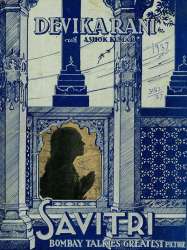
Savitri (1937)
, 2h16Themes Films based on mythology, Films about religion
Actors Devika Rani, Ashok Kumar, Mumtaz Ali
Savitri is born as a boon from the Sun God, to Ashwapati, the King of Madra and his wife Malawi. Savitri meets and falls in love with Satyavan, the son of the blind King Dumatasena. Dumtasena's Minister has taken over his kingdom and exiled the king, who now lives in the forest. When Savitri decides to marry Satyavan, the sage Narada advices against it, as according to the planetary charts, Satyavan will die a year following their marriage. However, Savitri insists on going ahead, ready to take on Yama the God of death. A year later when Savitri sees Yama carrying Satyavan's soul she follows and discourses with him, while cotinuing her pursuit. Finally, Yama tells her she can ask three boons of him except for Satyavan's life. The boons Savitri asks for are: sight for her father-in-law and restoration of his kingdom, her father should be granted a hundred sons, and last, she be granted a hundred sons. Yama gives in to her request, thereby restoring Satyavan's life. Her father-in-law's sight is restored and he learns of the death of his usurper.
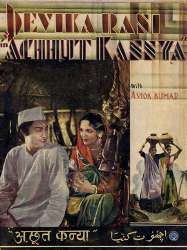
Untouchable Girl (1936)
, 2h22Genres Drama, Musical, Romance
Themes Films about music and musicians, Musical films, Bollywood
Actors Ashok Kumar, Devika Rani, Pramila, Mumtaz Ali
Roles Kasturi
Rating63%





Pratap (Ashok Kumar) and Kasturi (Devika Rani) are childhood friends, deeply in love with each other. Unfortunately, Pratap is a Brahmin and Kasturi an untouchable (achhut). Social mores of the time (the movies is set in the distant past, probably before 1900) preclude any possibility of the two ever uniting.
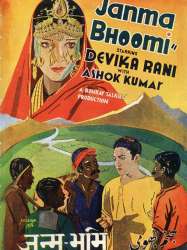
Janmabhoomi (1936)
Genres Drama, Romance
Actors Devika Rani, Ashok Kumar
Roles Protima
Rating61%





Protima Devi (Devika Rani) is in love with Dr. Ajoy Kumar Ghosh (Ashok Kumar), whom she has already accepted as her husband (eventhough they are not married yet). Ajoy is living in a village, where he is the only doctor.
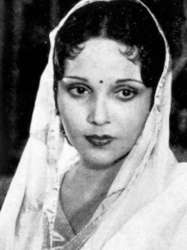
Karma (1933)
, 1h8Origin United-kingdom
Genres Drama
Themes Films about music and musicians, Musical films, Bollywood
Actors Devika Rani, Himanshu Rai, Abraham Sofaer
Roles Maharani
Rating61%





The story is about a princess (played by Devika Rani) who falls in love with a neighbouring prince much to the disapproval of the latter's father.
 Connection
Connection
